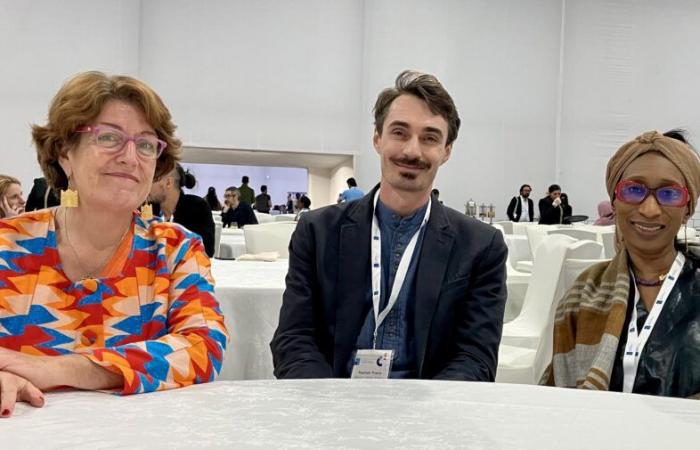This year was the second time that literary agent Raphaël Thierry and Agnès Debiage, consultant specializing in book ecosystems and dynamics in Africa, took a delegation of French-speaking publishers from sub-Saharan Africa and the Indian Ocean to Sharjah ( United Arab Emirates) to “open bridges” with other publishers, particularly from English-speaking Africa. This year 55 African publishers were present, including around thirty English-speaking publishers.
The Togolese journalist and author Simon of Saint-Dzokotoe works to promote reading through its association Lire au Togo. This year he organized the first Lomé Children's Book Fair (SALIJEL) with the help of the French Institute, UNESCO and the French Development Agency. Simon de Saint-Dzokotoe said he was happy that Ghana, an English-speaking country neighboring Togo, was present at the show. “ As book professionals, we must tackle this language barrier head on and break it down. »
Ghana, for example, surrounded by French-speaking countries, has just joined the International Organization of La Francophonie (OIF) and, conversely, Togo has joined the Commonwealth (the federation of territories formerly colonized by Great Britain). in 2022.
Different language zones
In Sharjah, Simon of Saint-Dzokotoe met publishers from Kenya, Rwanda and Cameroon but regrets that the nationals of these countries do not read more among themselves. In March 2025, he will organize a forum on children's publishing in Africa in Lomé where he will offer B2B meetings between publishers. He hopes that the different linguistic zones will be able to work together to transfer rights to each other or develop co-publications.
To create diversity in production, audiobook publishers will also be invited as But Dadsonfounder of AkooBooks Audio in Ghana, a digital streaming platform dedicated to African audiobooks. Ama Dadson produces audiobooks, mainly in English, but having lived for several years in Ivory Coast, she also produces them in French. Ama Dadson wants to create a network of audio studios in Africa, which, ideally, could cross these language barriers.
To download this document, you must first purchase the corresponding item.
Comforter Gunduzapublisher in Zimbabwe at Secondary Book Press, said he wanted to venture into purchasing rights for French-speaking books, starting first with books from the Democratic Republic of Congo, the closest French-speaking country to Zimbabwe.
« It is certain that we can do more in terms of cooperation between English-speaking and French-speaking people. », confirms Sulaiman Adebowalemultilingual editor at Amalion, in Senegal. He underlines the importance of the links forged between multilingual publishers who are part of the International Independent Publishing Alliance. Sulaiman Adebowale has already collaborated with French-speaking publishers in Morocco and Togo so that a book has a greater reach but has not yet purchased transfers of rights to African publishers.
Similar challenges
Kadiatou Konaré – The Best Of Kadiatou Konaré from Cauris Livres in Mali, in Sharjah for the first time, is delighted with the fluidity of contact. “ It opened things up for me. In Mali we are in our world and in Sharjah I learned new terms. It's good to renew your energy. »
She was referring to presentations on social networks, or on AI, but also to meetings with other publishers on the continent who often discover similar challenges. A round table organized by Mercy Kiruifrom eKitabu and Mvua Press in Kenya revealed several significant problems, including the lack of bookstores and distribution networks, the dominance of educational publishers and the lack of a national book policy on the part of many governments .
The publishers present at the round table – French-speaking, English-speaking, Portuguese-speaking or Arabic-speaking – unanimously expressed their wish to develop cross-border transfers of rights. We should also mention the African Network of Literary Events (RAMALI), which was built this year in Mali and intends to bring together initiatives dedicated to the development of books and literature in Africa, whatever the language.






